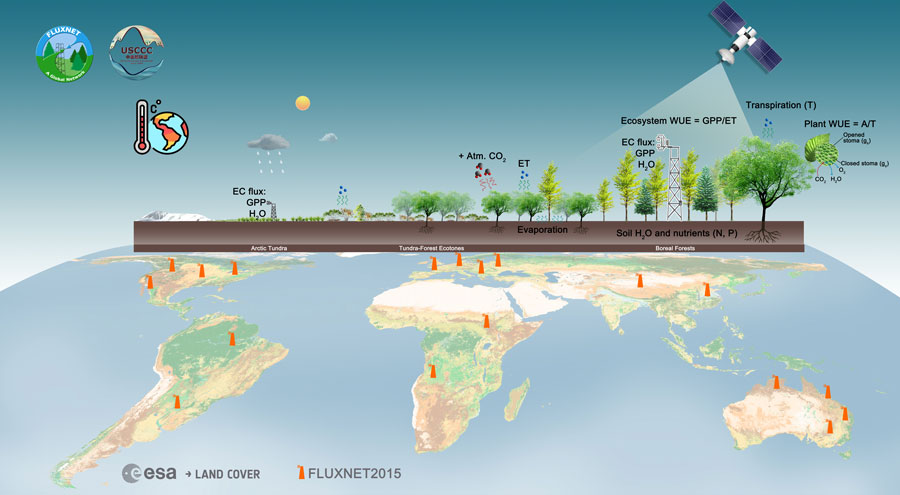MSU scientists find plants' ability to fight climate change is weakening
August 15, 2023 - Diane Huhn
New findings shed light on global water use efficiency in terrestrial ecosystems

It's often said that you should never put all your eggs in one basket. New research indicating that plants' ability to absorb carbon dioxide (CO2) may have stalled, just published in the journal Science by climate experts at Michigan State University, suggests that perhaps we shouldn't put all our climate mitigation hopes in too many plant-based strategies either, at least for the time being.
It's generally been assumed that when levels of CO2 rise rapidly in our atmosphere, as we've witnessed throughout the last century, plants adjust to these changing conditions by using less water while also taking up more of this heat-trapping gas during photosynthesis. However, these new findings may be shedding light on an unsettling trend—it appears that global warming is causing plants to not only use more water, but it also appears to be stalling the rates of CO2 absorption--in effect weakening plants' ability to mitigate further climate change over large areas of the planet. This could be a significant blow to many of the nature-based solutions currently proposed to help address the adverse effects of climate warming, making it more challenging to achieve carbon neutrality.
What is causing this startling change? "From 1982 to 2000, our research does show an increase in ecosystem water use efficiency. This is the ratio between their carbon assimilation abilities and their water evapotranspiration processes, which involve plants transferring water from the land to the atmosphere," said Jiquan Chen, a global change scientist and professor with the MSU Department of Geography, Environment and Spatial Sciences and the Center for Global Change and Earth Observations and one of the studies authors. "With increasing rates of CO2 s during this time span, this is what we expected to see. But, when we looked at these rates from 2001 to 2016, the data is showing us that this process has stalled out even though we know that rates of CO2 have not stalled in the least."
Using data from multiple satellites and FLUXNET, a global network of micrometeorological tower sites that measure the exchanges of carbon dioxide, water vapor, and energy between the terrestrial ecosystems and the atmosphere, the research team developed models to measure global water use efficiency across Earth's major biomes. (Animation courtesy of Jiquan Chen)
While a complex web of factors is at play, the team believes the most likely culprit leading to this change has to do with increasing vapor pressure deficit (VPD). "Essentially, we have a situation where the amount of water in the air versus the actual amount of water vapor the air can actually hold has changed," said Chen. "When VPD increases, as you might see in hotter, drier conditions, it stresses plants and causes them to consume more water, lowering their water use efficiency, while simultaneously weakening their ability to photosynthesize and sequester carbon."
If this trend has been occurring for over 20 years, why has it taken so long to uncover? Not only is it no easy feat to execute the highly complex calculations necessary to quantify these changes on a global scale, but the team has also had to rely on gathering data from a variety of sources, "If we had tried to study these processes 10 or 15 years ago, we would not have been able to do so at a global scale given the limited data and technology of the time," explained Chen. But given improved monitoring technology, ever-increasing computing power, new machine-learning methods, and a growing global monitoring network called FLUXNET, long championed by Chen, the team has been able to develop several models for the planet's major biological communities.
While it is difficult to predict how future changes to Earth's terrestrial systems may impact global water use efficiency, this study emphasizes that human reliance on nature-based climate sinks to achieve carbon neutrality may be undermined by the adverse effects of climate warming.
In addition to Chen, team members include other MSU-related researchers, including lead author Fei Li, a former postdoc at Chen's lab in the Center for Global Change and Earth Observations (CGCEO), now with the Chinese Academy of Agricultural Sciences; Ranjeet John, another former postdoc at CGCEO and a former student of Chen, now a professor at the University of South Dakota; and Michael Abraha, also at the lab in CGCEO. Additional authors include Jingeng Xiao, University of New Hampshire; Ashley Ballantyne, University of Montana; Ke Jin and Bing Li, Chinese Academy of Agricultural Sciences.

